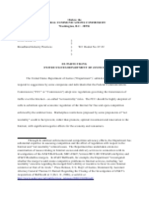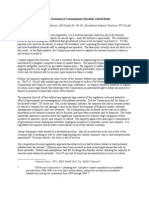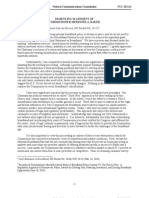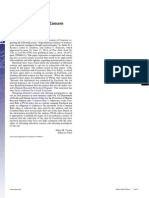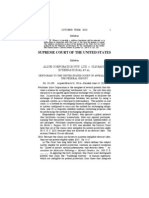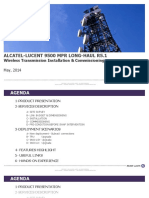NCTA Title II Letter 5-14-14
NCTA Title II Letter 5-14-14
Uploaded by
Brian FungCopyright:
Available Formats
NCTA Title II Letter 5-14-14
NCTA Title II Letter 5-14-14
Uploaded by
Brian FungCopyright
Available Formats
Share this document
Did you find this document useful?
Is this content inappropriate?
Copyright:
Available Formats
NCTA Title II Letter 5-14-14
NCTA Title II Letter 5-14-14
Uploaded by
Brian FungCopyright:
Available Formats
May 14, 2014
Marlene H. Dortch
Secretary
Federal Communications Commission
445 12th Street, S.W.
Washington, D.C. 20554
Re: Protecting and Promoting the Open Internet, GN Docket No. 14-28
Dear Ms. Dortch:
On behalf of the National Cable & Telecommunications Association (NCTA), I write
to underscore our deep concerns regarding recent proposals to reclassify broadband Internet
access services (or some component thereof) as telecommunications services subject to Title II
of the Communications Act. As explained in NCTAs prior comments in this docket,
1
the
existing transparency rules provide a strong foundation for promoting Open Internet principles,
and, to the extent the Commission determines that additional safeguards are necessary, the
Verizon decision provides ample leeway to adopt such measures pursuant to Section 706 of the
Telecommunications Act.
2
In light of that recently confirmed authority, it is wholly unnecessary
to pursue a Title II reclassification theory. It also would be immensely destabilizing. Indeed,
any effort to subject broadband Internet access services to common carrier regulation would do
far more harm than good, as such a heavy-handed framework would discourage network
investment necessary to fuel the virtuous cycle of deployment, innovation, and adoption that
the Commission has long sought to promote under Section 706.
As the Commission and numerous stakeholders have recognized, cable operators and
telecommunications companies have made massive private investments in broadband networks,
unleashing innovation and dramatically increased consumer welfare.
3
The Commissions 2002
determination and subsequent reaffirmations that broadband Internet access is an integrated
information service without any severable telecommunications service component were a critical
factor in creating the stable regulatory climate that attracted investment and enabled the Internet
1
Comments of the National Cable & Telecommunications Association, GN Docket No.
14-28 (filed Mar. 26, 2014).
2
Verizon v. FCC, 740 F.3d 623 (D.C. Cir. 2014).
3
Federal Communications Commission, Connecting America: The National Broadband
Plan, at XI (2010).
Ms. Marlene Dortch
May 14, 2014
Page 2
to become a key driver of our economy and a central aspect of our lives.
4
In fact, the
Commission and the Department of Justice (DOJ) sought Supreme Court review in the Brand
X case to prevent the imposition of common carrier regulation on broadband services based in
large part on the concern that such regulation would entail significant burdens that could prevent
or delay the deployment of new broadband infrastructure, particularly in rural or other
underserved areas.
5
The Court upheld the Commissions information-service classification
based on the factual particulars of how Internet technology works and how it is provided.
6
As a threshold matter, it is far from clear that the Commission could simply abandon the
fact-based classification it adopted and repeatedly confirmed over the past 12 years. The
classification of broadband Internet access turns on the nature of the functions that the end user
is offered,
7
and those functions have not materially changed since the Commission analyzed
them in its previous orders. Notably, cable operators have never provided broadband
transmission as common carriers. Moreover, where, as here, such a classification has
engendered serious reliance interests, and any effort to reclassify broadband Internet access
would contradict factual findings which underlay [the FCCs] prior policy, the Commission
would need to provide a more detailed justification than what would suffice for a new policy
created on a blank slate.
8
At a minimum, pursuing Title II reclassification would plunge the
broadband industry into a lengthy period of uncertainty while a new round of appellate
proceedings ran its coursea process that can be easily avoided by relying on the roadmap
provided by the Verizon court.
But even assuming the Commission could lawfully reclassify broadband services, it
would be profoundly counterproductive to do so. The burdens and uncertainty associated with
Title II regulation (or even the threat of such regulation) would deter broadband providers from
making the substantial additional investments required to deploy new and upgraded broadband
infrastructure. As noted, the Commission and DOJ emphasized that very risk in their petition in
4
Inquiry Concerning High-Speed Access to the Internet Over Cable and Other Facilities,
Declaratory Ruling and Notice of Proposed Rulemaking, 17 FCC Rcd 4798 (2002)
(Cable Modem Declaratory Ruling); see also, e.g., Appropriate Framework for
Broadband Access to the Internet over Wireline Facilities, Report and Order and Notice
of Proposed Rulemaking, 20 FCC Rcd 14853 (2005) (classifying wireline broadband
services as information services); Appropriate Regulatory Treatment for Broadband
Access to the Internet Over Wireless Networks, Declaratory Ruling, 22 FCC Rcd 5901
(2007) (classifying wireless broadband services as information services).
5
Petition for Writ of Certiorari, U.S. Dept. of Justice and FCC, FCC v. Brand X Internet
Servs., No. 04-277, at 25-26 (Aug. 27, 2004) (Brand X Cert Petition).
6
Natl Cable & Telecomms. Assn v. Brand X Internet Servs., 545 U.S. 967, 991 (2005).
7
Cable Modem Declaratory Ruling 38.
8
FCC v. Fox Television Stations, Inc., 556 U.S. 502, 515 (2009).
Ms. Marlene Dortch
May 14, 2014
Page 3
the Brand X case,
9
and it remains just as serious today. The Commission has estimated that
reaching the broadband deployment goals set forth in the National Broadband Plan could require
as much as $350 billion in private investment,
10
but the specter of Title II regulation would
significantly diminish network providers ability to attract that level of investment. A wide array
of financial analysts and industry observers have reached the same conclusion, arguing
emphatically that the threat of Title II reclassification would damage broadband providers,
discourage infrastructure investment, stifle job growth, and harm consumers.
11
Indeed, in other contexts where the government has imposed public utility-style
regulation, such an approach has led to chronic under-investment in basic infrastructure. One
need only examine our nations ailing public infrastructure to appreciate the potential dangers to
the continued expansion and growth of broadband networks.
12
The contrast is striking when one
compares the crisis in public utility infrastructure with the dynamism and stable investment in
broadband Internet services.
13
9
Brand X Cert Petition at 25-26.
10
See FCC Staff Presentation, September 2009 Commission Meeting, at 45 (Sep. 29, 2009),
http://hraunfoss.fcc.gov/edocs_public/attachmatch/DOC-293742A1.pdf.
11
See, e.g., Anna-Maria Kovacs, The Internet Is Not a Rotary Phone, Re/code, May 12,
2014, available at http://recode.net/2014/05/12/the-internet-is-not-a-rotary-phone/
(comparing robust investment in broadband in the U.S. to diminished investment in
Europe, which has continued to regulate its telecommunications industry along the lines
of Title II); Bret Swanson, Title II Communications Is the Slow Lane, Tech Policy
Daily, May 13, 2014, available at http://www.techpolicydaily.com/communications/title-
ii-communications-slow-lane/ (explaining that [a]s the mostly unregulated Internet piles
success upon success, boosting bandwidth and transforming each industry it touches,
with no end in sight, the old, heavily regulated, Title II network is barely an afterthought
and is rapidly approaching full retirement); see also Letter of Robert W. Quinn, Senior
Vice President, AT&T, to Marlene H. Dortch, Secretary, FCC, GN Docket No. 14-28, at
2-4 (May 9, 2014) (AT&T May 9 Letter) (summarizing other analysts commentary on
the risks of Title II reclassification theories).
12
A recent study found that most of Americas drinking water infrastructure is nearing the
end of its useful life and will need $1 trillion in investment in the coming decades, and
that Americas electric grid will require a $736 billion shot in the arm by 2020 to keep it
from failing. See American Society of Civil Engineers, 2013 Report Card for Americas
Infrastructure, available at http://www.infrastructurereportcard.org. The same study
found that one in three major U.S. roads is in poor or mediocre condition and that
repairing and maintaining these roads will require an estimated $170 billion in annual
investment, and that one in four bridges is either functionally obsolete or structurally
deficient. Id.
13
Broadband speeds have increased 1500 percent in the last decade. Michael Powell,
Keynote Remarks: 2014 Cable Show (Apr. 29, 2014), at 3, available at
https://www.ncta.com/sites/prod/files/NCTA-MichaelPowellKeynoteRemarks_0.pdf.
Ms. Marlene Dortch
May 14, 2014
Page 4
And the risks associated with Title II regulation would extend far beyond the chilling of
investment and innovation by broadband Internet access providers. If the transmission
component(s) of broadband Internet access were to be treated as distinct telecommunications
services, there is no sound principle that would justify limiting such a classification to last-mile
providers; to the contrary, other entities that provide transmission (such as backbone providers
and content delivery networks) could become subject to Title II.
14
Nor could the Commission overcome such obstacles by forbearing from unwanted and
overbroad aspects of Title II. Any such undertaking would be massively complex and
contentious, given the myriad provisions that are included in Title II and relevant Commission
precedent. As a result, the forbearance process itself would engender enormous uncertainty, as
the Commission has previously recognized.
15
And any grant of forbearance would be subject to
judicial challenge and/or potential revocation by a later Commission.
Moreover, subjecting broadband access providers to regulation under Title II would not
even accomplish the goal that reclassification proponents apparently seek. Reclassification
would not support a categorical prohibition on Internet fast lanes any more than Section 706
would. Section 202 of the Act does not impose a duty of nondiscrimination, but rather
proscribes only unjust or unreasonable discrimination.
16
The relevant precedent makes clear
that carriers subject to this standard have considerable flexibility to differentiate among
customers for various legitimate business reasons.
17
Accordingly, whatever the Commissions
ultimate judgment about the potential benefits and harms associated with paid prioritization and
Moreover, as the Commission is aware, Americas Internet providers have invested well
over $1 trillion dollars since 1996 to make Americas Internet world-class. See Inquiry
Concerning the Deployment of Advanced Telecommunications Capability to All
Americans in a Reasonable and Timely Fashion, and Possible Steps to Accelerate Such
Deployment Pursuant to Section 706 of the Telecommunications Act of 1996, as Amended
by the Broadband Data Improvement Act, Eighth Broadband Progress Report, 27 FCC
Rcd 10342 (2012).
14
As AT&T has pointed out, reclassification of last-mile transmission under Title II also
could import the broken intercarrier compensation scheme to the exchange of Internet
traffic, among various other unintended and disruptive consequences. See AT&T May 9
Letter at 5.
15
See Brand X Cert Petition at 28 (explaining that forbearance authority is not in this
context an effective means of remov[ing] regulatory uncertainty that in itself may
discourage investment and innovation).
16
47 U.S.C. 202(a).
17
See, e.g., Orloff v. FCC, 352 F.3d 415 (D.C. Cir. 2003) (upholding carriers ability to
offer differential discounts to retail customers); Southwestern Bell Tel. Co. v. FCC, 19
F.3d 1475, 1481 (D.C. Cir. 1994) (upholding carriers ability to enter into individualized
contracts); Ameritech Operating Cos. Revisions to Tariff FCC No. 2, Order, DA 94-1121
(CCB 1994) (upholding reasonableness of rate differentials based on cost considerations).
Ms. Marlene Dortch
May 14, 2014
Page 5
similar arrangements, any such practices will have to be reviewed on a case-by-case basis
pursuant to general standards promulgated by the Commission, regardless of whether the
Commission seeks to rely on Section 706 or Title II.
As reflected in our recent comments, NCTA seeks to be a constructive partner in any new
dialogue about new Open Internet rules. While the substance of proposed rules can be fairly
debated, there is no sound reason to pursue reclassification under Title II.
Sincerely,
/s/ Rick Chessen
Rick Chessen
You might also like
- CMJ Et Al PIC Wireless Reply CommentsDocument10 pagesCMJ Et Al PIC Wireless Reply CommentsMAG-NetNo ratings yet
- Choice 1 ToolkitDocument26 pagesChoice 1 ToolkitRaghavanJayaramanNo ratings yet
- Cat Fleet & Health V4.0 PDFDocument159 pagesCat Fleet & Health V4.0 PDFricardocano100% (1)
- 12-30-14 Title II Letter FINALDocument4 pages12-30-14 Title II Letter FINALWaPoTheSwitchNo ratings yet
- May 9 Ex Parte LetterDocument9 pagesMay 9 Ex Parte Letterjbrodkin2000No ratings yet
- Via Ecfs: Re: American Cable Association Ex Parte Submission On Protecting andDocument12 pagesVia Ecfs: Re: American Cable Association Ex Parte Submission On Protecting andapi-28585862No ratings yet
- Via Electronic Filing: 1. Application of Section 224Document4 pagesVia Electronic Filing: 1. Application of Section 224Karl BodeNo ratings yet
- Public Interest Broadband Reclassification CommentsDocument33 pagesPublic Interest Broadband Reclassification CommentsMAG-NetNo ratings yet
- Profs Re Comcast MergerDocument16 pagesProfs Re Comcast Mergerjeff_roberts881No ratings yet
- Official Summary of New FCC Net Neutrality RulesDocument5 pagesOfficial Summary of New FCC Net Neutrality RulesChris GrundemannNo ratings yet
- Public Knowledge Berkman Comments in FCC GN 09 47 Filed 11-16-2009Document26 pagesPublic Knowledge Berkman Comments in FCC GN 09 47 Filed 11-16-2009StimulatingBroadband.comNo ratings yet
- Peering Letter v10 21411Document6 pagesPeering Letter v10 21411StimulatingBroadband.comNo ratings yet
- Assn Title II Letter FINALDocument3 pagesAssn Title II Letter FINALKarl BodeNo ratings yet
- FCC-05-151 Court DocumentDocument3 pagesFCC-05-151 Court DocumentUnderseenNo ratings yet
- 04-26-10 Google Open Internet Reply Comments (GN DKT 09-191)Document65 pages04-26-10 Google Open Internet Reply Comments (GN DKT 09-191)mistiquecanoNo ratings yet
- Netflix FCC CommentsDocument28 pagesNetflix FCC Commentsjeff_roberts881100% (1)
- NCTA 706 Ex Parte 1-22-15Document5 pagesNCTA 706 Ex Parte 1-22-15WaPoTheSwitchNo ratings yet
- Federal Communications Commission Washington, D.C. 20554Document13 pagesFederal Communications Commission Washington, D.C. 20554politixNo ratings yet
- Federal Communications Commission 445 12 Street, S.W. Washington, D. C. 20554Document3 pagesFederal Communications Commission 445 12 Street, S.W. Washington, D. C. 20554Federal Communications CommissionNo ratings yet
- AT&T Reply To Wilkins 12-15-16Document6 pagesAT&T Reply To Wilkins 12-15-16shgustinNo ratings yet
- OpenInternet ExParte 021815Document5 pagesOpenInternet ExParte 021815mmtconline_bbsjNo ratings yet
- Broadband Deployment and The Digital Divide: A Primer, Cato Policy Analysis No. 410Document34 pagesBroadband Deployment and The Digital Divide: A Primer, Cato Policy Analysis No. 410Cato InstituteNo ratings yet
- Net NeutralityDocument2 pagesNet NeutralityAdam TorresNo ratings yet
- Windhausen Jan09 SuperfastDocument32 pagesWindhausen Jan09 SuperfastcharlesjameskatuaNo ratings yet
- OPASTCO Comments To NTIA-RUS For Broadband Stimulus Round I RulesDocument23 pagesOPASTCO Comments To NTIA-RUS For Broadband Stimulus Round I RulesStimulatingBroadband.comNo ratings yet
- MMTC Exparte Letter 103014Document5 pagesMMTC Exparte Letter 103014mmtconline_bbsjNo ratings yet
- Federal Communications Commission DA 15-563Document19 pagesFederal Communications Commission DA 15-563nicholasdeleoncircaNo ratings yet
- 14-28 12-17-2014 Verizon 60001010005Document9 pages14-28 12-17-2014 Verizon 60001010005nicholasdeleoncircaNo ratings yet
- Statement of Commissioner Meredith Attwell BakeDocument15 pagesStatement of Commissioner Meredith Attwell BakeJosh StearnsNo ratings yet
- Net NeutralityDocument9 pagesNet NeutralityIO IONo ratings yet
- CFJ Comments To FCC Docket No. 17-108 - April20Document4 pagesCFJ Comments To FCC Docket No. 17-108 - April20The Committee for JusticeNo ratings yet
- Commissioner O'Rielly's Statement On Net NeutralityDocument9 pagesCommissioner O'Rielly's Statement On Net NeutralitymashablescribdNo ratings yet
- FCC 10 114a6Document2 pagesFCC 10 114a6Phil WolffNo ratings yet
- Comments of Independent Telephone & Telecommunciations AllianceDocument2 pagesComments of Independent Telephone & Telecommunciations AllianceStimulatingBroadband.comNo ratings yet
- Federal Communications Commission 445 12 Street, S.W. Washington, D. C. 20554Document2 pagesFederal Communications Commission 445 12 Street, S.W. Washington, D. C. 20554Phil WolffNo ratings yet
- Comments of The National Cable & Telecommunciations AssociationDocument4 pagesComments of The National Cable & Telecommunciations AssociationStimulatingBroadband.comNo ratings yet
- AT&T Submission To FCC Re: Wireless Approval ProcessDocument26 pagesAT&T Submission To FCC Re: Wireless Approval ProcessDavid SangerNo ratings yet
- Network NeutralityDocument127 pagesNetwork Neutralitycorina_0110No ratings yet
- Before The Federal Communications Commission Washington, D.C. 20554Document15 pagesBefore The Federal Communications Commission Washington, D.C. 20554rnclarkeNo ratings yet
- Triple PlayDocument45 pagesTriple Playken.berlandNo ratings yet
- Don't Be Fooled by FCC's Proposal For 10 1 Mobile Broadband Speed - Jeff - Hannah - 09!21!2017Document5 pagesDon't Be Fooled by FCC's Proposal For 10 1 Mobile Broadband Speed - Jeff - Hannah - 09!21!2017Jeff HannahNo ratings yet
- 05.28.14 LATTA Broadband BillDocument6 pages05.28.14 LATTA Broadband Billjbrodkin2000No ratings yet
- The United States Telecom Association StoryDocument6 pagesThe United States Telecom Association Storyjoko-jacksNo ratings yet
- Ed 07 06 05Document16 pagesEd 07 06 05Mark AldissNo ratings yet
- Letter FCC Genachowski To Henry Waxman FCC 05.19.11Document5 pagesLetter FCC Genachowski To Henry Waxman FCC 05.19.11Daryl JonesNo ratings yet
- 2018 03464Document284 pages2018 03464Tristan GreeneNo ratings yet
- Proposed FCC Rule-Making On Net NeutralityDocument2 pagesProposed FCC Rule-Making On Net NeutralityfranberkmanNo ratings yet
- FCC Report On ATT OutageDocument10 pagesFCC Report On ATT OutageDoc BulletinNo ratings yet
- Should Net NeutralityDocument2 pagesShould Net Neutralitydj weshmaticNo ratings yet
- Wireless Internet Access 3G vs. WiFiDocument22 pagesWireless Internet Access 3G vs. WiFibeelllaNo ratings yet
- EX PARTE FILING Justice Department To FCCDocument10 pagesEX PARTE FILING Justice Department To FCCanon-720552No ratings yet
- Wireless Internet Access: 3G vs. Wifi?: Wlehr@Mit - EduDocument23 pagesWireless Internet Access: 3G vs. Wifi?: Wlehr@Mit - EduAhmed AnwarNo ratings yet
- Current Telecom Developments October 28 2011Document4 pagesCurrent Telecom Developments October 28 2011Kim HedumNo ratings yet
- Fiber To The Home CouncilDocument50 pagesFiber To The Home CouncilStimulatingBroadband.comNo ratings yet
- FCC Launches Broad Rulemaking On How Best To Protect and Promote The Open InternetDocument2 pagesFCC Launches Broad Rulemaking On How Best To Protect and Promote The Open InternetBrian RiesNo ratings yet
- Verizon v. FCC Net Neutrality Ruling.Document81 pagesVerizon v. FCC Net Neutrality Ruling.Lorenzo Franceschi-BicchieraiNo ratings yet
- U.S. Telecom Infrastructure Crisis: America’s botched modernization of copper to fiber -- and the path forwardFrom EverandU.S. Telecom Infrastructure Crisis: America’s botched modernization of copper to fiber -- and the path forwardNo ratings yet
- Service Unavailable: America’s Telecommunications Infrastructure CrisisFrom EverandService Unavailable: America’s Telecommunications Infrastructure CrisisNo ratings yet
- What's Yours Is Mine: Open Access and the Rise of Infrastructure SocialismFrom EverandWhat's Yours Is Mine: Open Access and the Rise of Infrastructure SocialismNo ratings yet
- The Dynamic Internet: How Technology, Users, and Businesses are Changing the NetworkFrom EverandThe Dynamic Internet: How Technology, Users, and Businesses are Changing the NetworkNo ratings yet
- Municipal Broadband: A Guide to Politics, Policies, and Success FactorsFrom EverandMunicipal Broadband: A Guide to Politics, Policies, and Success FactorsNo ratings yet
- Digital Crossroads, second edition: Telecommunications Law and Policy in the Internet AgeFrom EverandDigital Crossroads, second edition: Telecommunications Law and Policy in the Internet AgeRating: 3.5 out of 5 stars3.5/5 (4)
- Pnas 201412469 - FINAL (1) - 1Document1 pagePnas 201412469 - FINAL (1) - 1Brian FungNo ratings yet
- SCOTUS Alice RulingDocument21 pagesSCOTUS Alice RulingbelrilNo ratings yet
- Airbnb, Inc., v. Eric T. Schneiderman, Attorney General of The State of New YorkDocument13 pagesAirbnb, Inc., v. Eric T. Schneiderman, Attorney General of The State of New YorkAnonymous 52qjOHavDNo ratings yet
- Congress Inquires About Google GlassDocument3 pagesCongress Inquires About Google GlassWSJTechNo ratings yet
- 03-05-2013 Wireless Device Independence Act Bill TextDocument3 pages03-05-2013 Wireless Device Independence Act Bill TextBrian Fung100% (1)
- Presented By: Wajid Ali HamdaniDocument9 pagesPresented By: Wajid Ali HamdaniGulab VatsNo ratings yet
- Draft of ContentsDocument19 pagesDraft of Contentstianya0309No ratings yet
- Template BlogDocument136 pagesTemplate BlogBagus Dwi SaputraNo ratings yet
- The Perfect Day Formula by Craig Ballantyne 1619613557Document5 pagesThe Perfect Day Formula by Craig Ballantyne 1619613557KazunyAnime Piano0% (2)
- Analysis of EasyJet and Indian Low Cost Airlines StrategiesDocument14 pagesAnalysis of EasyJet and Indian Low Cost Airlines StrategiesNitika MishraNo ratings yet
- 9500 MPR Long Haul - Training I&C R5.1 DraftDocument49 pages9500 MPR Long Haul - Training I&C R5.1 DraftAtanda Babatunde Mutiu100% (1)
- Infoblox Infographic Improve Threat Resolution Cycles by Leveraging DnsDocument1 pageInfoblox Infographic Improve Threat Resolution Cycles by Leveraging Dnsmohan1233No ratings yet
- CHAPTER II Communication and GlobalizationDocument21 pagesCHAPTER II Communication and GlobalizationLeslie AnasNo ratings yet
- Creo Manufacturing 4 0 PDFDocument26 pagesCreo Manufacturing 4 0 PDFtwo-1No ratings yet
- Performance Optimization Cheat SheetDocument3 pagesPerformance Optimization Cheat SheetBittu KumarNo ratings yet
- Lecture On VB - Net With Oracle DatabaseDocument71 pagesLecture On VB - Net With Oracle Databasejcapucao265No ratings yet
- Web Technologies - ITC 351 Lecture - 1Document14 pagesWeb Technologies - ITC 351 Lecture - 1kusiasare73No ratings yet
- ETransfer Applicants ManualDocument12 pagesETransfer Applicants ManualBilalNo ratings yet
- FortiGate 80E Series (Entry Level)Document6 pagesFortiGate 80E Series (Entry Level)juantamad02No ratings yet
- ReportDocument12 pagesReportShiVani KoLash100% (1)
- V2V Qos Guaranteed Channel Access in Ieee 802.11P Vanets: Che-Yu Chang, Hsu-Chun Yen, and Der-Jiunn Deng, Member, IeeeDocument13 pagesV2V Qos Guaranteed Channel Access in Ieee 802.11P Vanets: Che-Yu Chang, Hsu-Chun Yen, and Der-Jiunn Deng, Member, IeeeRafael AcostaNo ratings yet
- UnME JeansDocument5 pagesUnME Jeanstirath5uNo ratings yet
- C&NS UNIT-5pdfDocument28 pagesC&NS UNIT-5pdfDhanush GummidiNo ratings yet
- GAE-Google App EngineDocument16 pagesGAE-Google App Enginecharge974No ratings yet
- Program FlowDocument2 pagesProgram FlowJames SyNo ratings yet
- Everything Curl: ReadmeDocument350 pagesEverything Curl: ReadmePrem ShirkeNo ratings yet
- ArubaOS CX Switching Fundamentals DatasheetDocument4 pagesArubaOS CX Switching Fundamentals DatasheetRicardo GuerraNo ratings yet
- PKI and Digital Certification InfrastructureDocument6 pagesPKI and Digital Certification InfrastructurePramedicaPerdanaPutraNo ratings yet
- Padhle-A IDocument61 pagesPadhle-A IAmaan AhmadNo ratings yet
- Cyril Hepher - The Fruits of SilenceDocument273 pagesCyril Hepher - The Fruits of Silenceancientwisdom2014No ratings yet
- Technological Institute of The Philippines Technological Institute of The PhilippinesDocument2 pagesTechnological Institute of The Philippines Technological Institute of The PhilippinesEleazer JabatNo ratings yet
- Second Summative Test in English 7Document1 pageSecond Summative Test in English 7MIGUELA SP. SANTIAGO100% (17)
- Same Day Resume by Michael FarrDocument20 pagesSame Day Resume by Michael FarrKarl NeoNo ratings yet

















